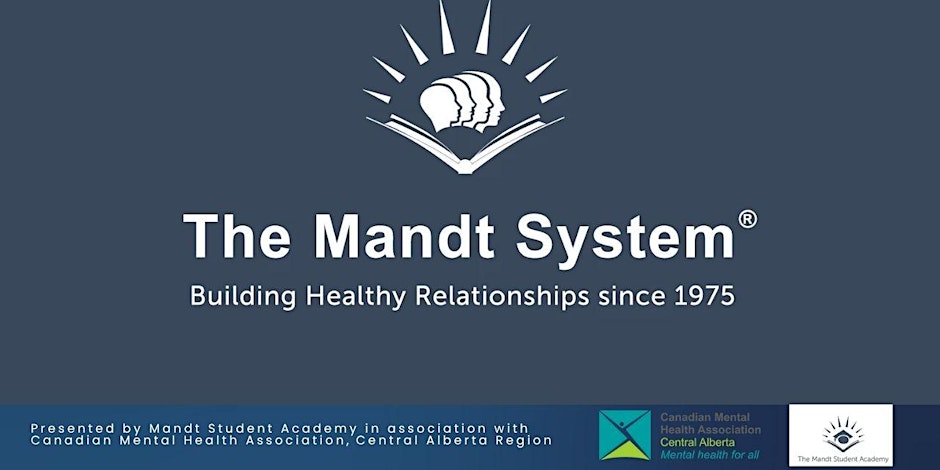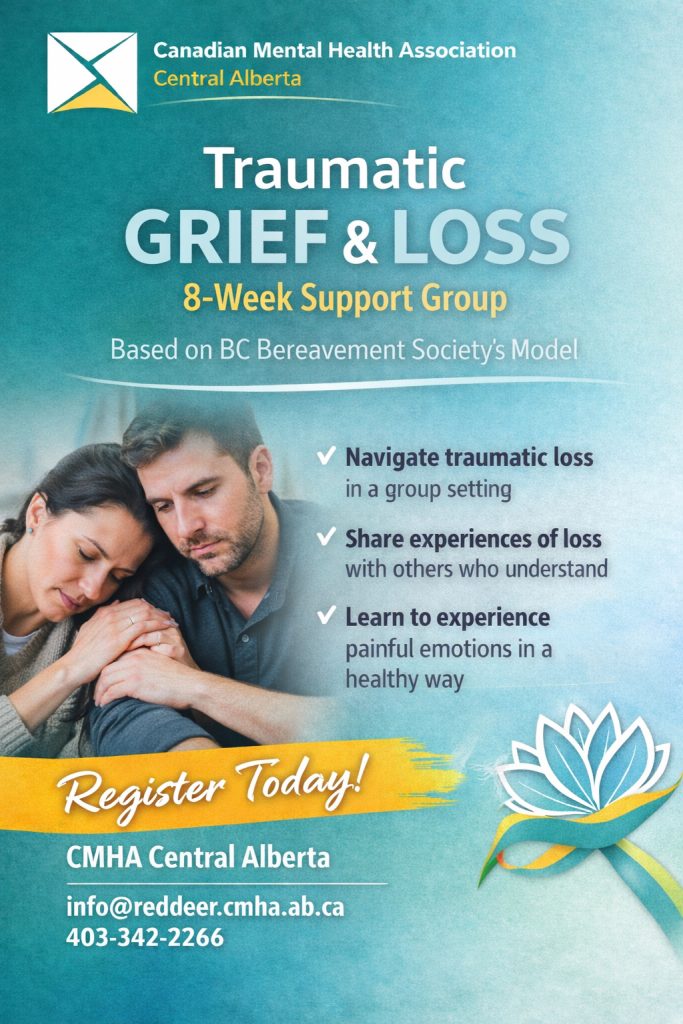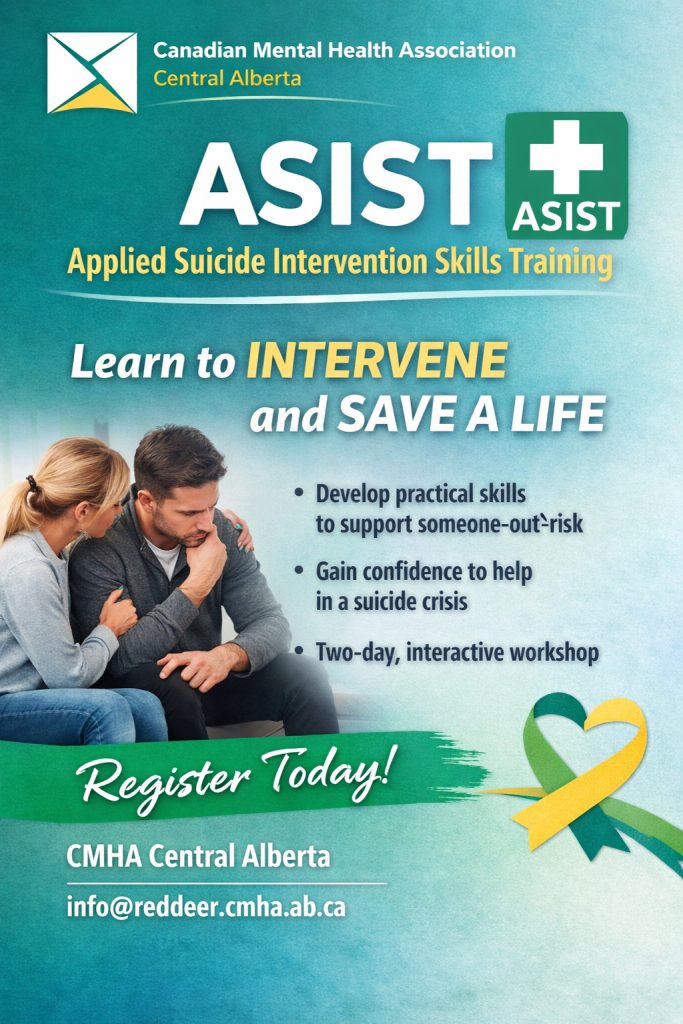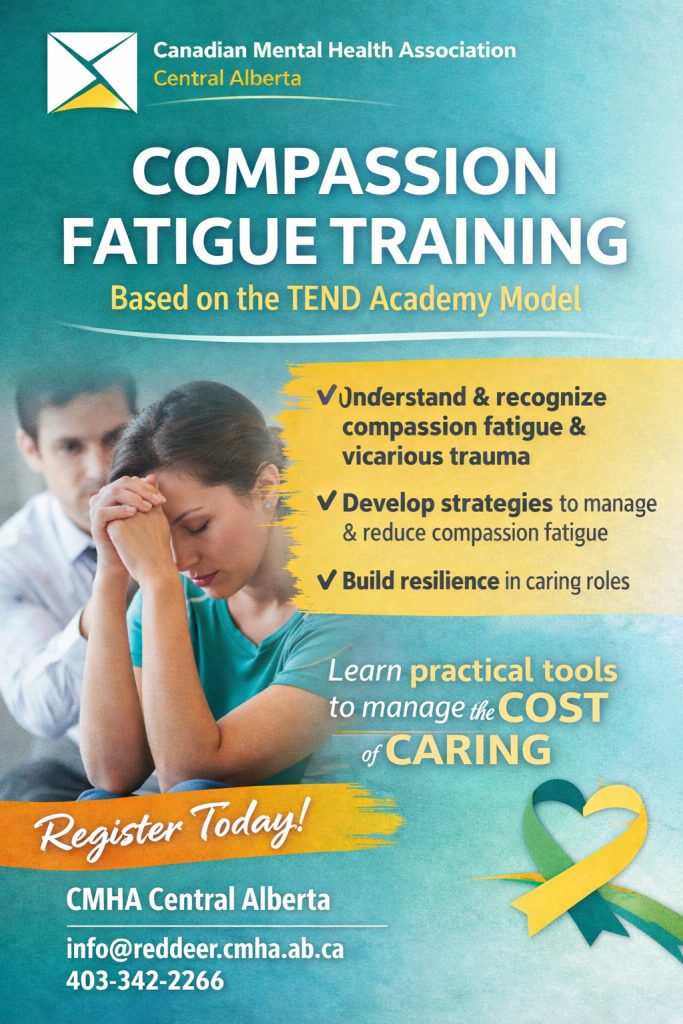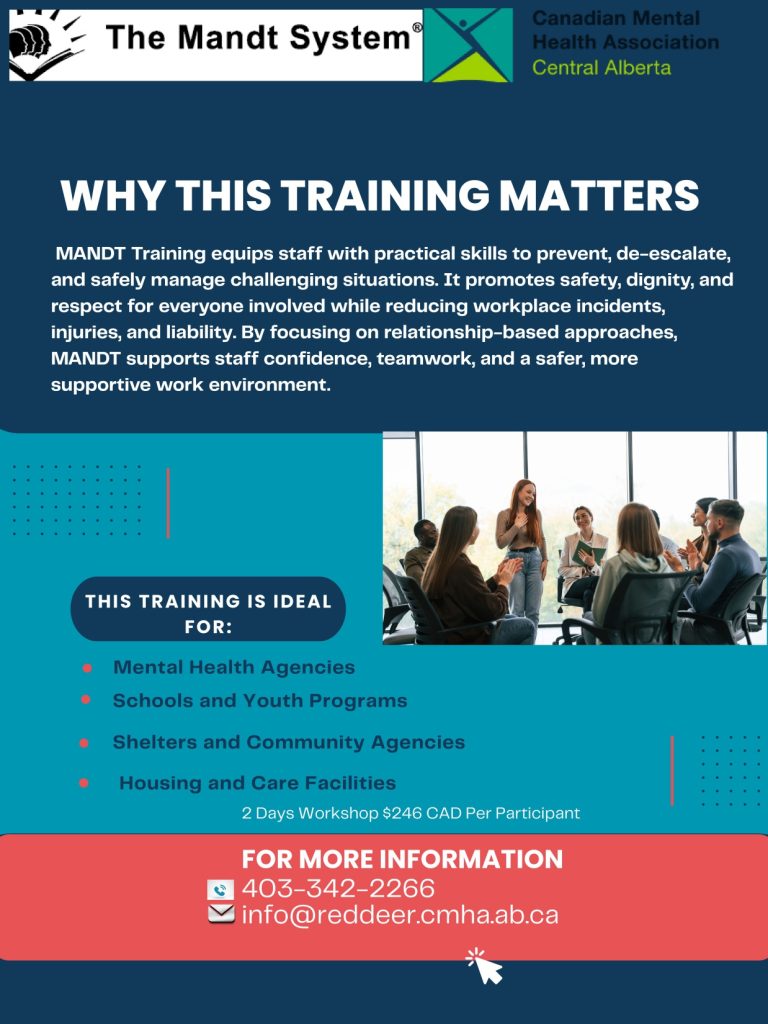Our Services
The Canadian Mental Health Association provides recovery-focused services for people of all ages and their families. Follow the links below for details.
Courses - Recovery College Central Alberta
All Recovery College Central Alberta education courses are free and offered online through Zoom. Support groups and multi-session courses may once again be available in a blended format, with some people attending in our Learning Centre and others attending over Zoom. If you want to attend in-person at our Learning Centre, you must call us at 403-967-0473. You must also do the online registration, through the Recovery College Calendar Page at https://recoverycollegecentralalberta.ca/events/.[…]
Recovery College has its own website at https://recoverycollegecentralalberta.ca
Please visit the calendar to see our current schedule. Click on the links to register for the classes you would like to take. When you register, you will get a confirmation email which includes instructions for using Zoom. Please feel free to come into Zoom 10 minutes before the class if you need a bit of tech support. We do not provide tech support once the class begins.
At Recovery College, our educational-based approach focuses on helping people recognize and develop their own resourcefulness and awareness in order to support themselves or their loved one’s recovery journey. All of our courses are developed and delivered in partnership with our peer supporters who are experts by experience: they have their own story of a mental health or substance concern or are supporting a loved one.
Everyone is welcome to attend our free courses and drop-in classes. No previous experience is required and with many courses to choose from, there is a course for everyone.
Alberta Brain Injury Network (ABIN)
Alberta Brain Injury Network (ABIN), Central Region is part of a province-wide network providing service to adults with an acquired brain injury to live, work, and participate in their communities.
We serve the communities of: Stettler, Rimbey, Wetaskiwin, Lloydminster, Camrose, Rocky Mountain House, Sylvan Lake, Lacombe, Ponoka, Olds, Bowden, Sundre, Carstairs, Hanna, Drumheller, Red Deer, O’Chiese, Sunchild, Maskwacis, and surrounding areas within the Central Alberta Region. […]
Alberta Brain Injury Network (ABIN), Central Region is part of a province-wide network providing service to adults with an acquired brain injury to live, work, and participate in their communities.
We serve the communities of: Stettler, Rimbey, Wetaskiwin, Lloydminster, Camrose, Rocky Mountain House, Sylvan Lake, Lacombe, Ponoka, Olds, Bowden, Sundre, Carstairs, Hanna, Drumheller, Red Deer, O’Chiese, Sunchild, Maskwacis, and surrounding areas within the Central Alberta Region.
Who is This Program For?
This program is for people aged 18 years of age and older, who are living with a diagnosed, acquired brain injury (e.g. stroke, lack of oxygen for a period of time, brain tumour, brain infections, like meningitis and encephalitis, or traumatic brain injury like from a blow to the head, concussion, or motor vehicle accident), can provide voluntary, informed consent, and experience difficulties in accessing necessary supports and services to help them participate as citizens of the community.
How can a Service Coordinator help?
Service Coordinators provide assistance in the following ways::
- Support: Identifying and responding to the needs of survivors, families and caregivers. Assisting survivors and their families to identify, apply for, and coordinate benefits and services
- Coordination: Assisting survivors to access necessary supports and resources in their community. Making referrals, where appropriate, for community supports and independent living skills development
- Community Capacity: Increasing community awareness, building partnerships and seeking opportunities to promote inclusive communities.
- Education: Providing opportunities to enhance knowledge and understanding of acquired brain injury and the supports and services that are available.
What is the Supports for Community Living Program?
The Supports for Community Living (SCL) program provides short term flexible supports to a person who has sustained an acquired brain injury. The emphasis is on developing and learning daily living skills and to promote and maximize each individual’s independence. The role of the SCL worker is to provide training to these individuals in preparation for independent living and to provide support and modeling for the client’s support network, helping them to develop support skills that contribute to long term solutions for the client.
How Much Support is Provided and for How Long?
The amount and type of support provided is based upon individual need, though this service is intended to be short term.
How Do I Access This Program?
Referrals may be made through a number of sources, including directly contacting our office at 403-342-2266. A referral can be made on your behalf by others such as medical professionals, mental health or financial workers, or concerned family or friends, or by the survivor themselves.
Please print this form, fill it out, and send to abin@reddeer.cmha.ab.ca
Alberta Brain Injury Initiative : survival guide (June 2021)
Pathways 2 Housing
Pathways to Housing (Pathways or P2H) specifically targets chronically homeless persons who are disabled by serious mental illness and addiction, made even more complex with a multitude of health and social issues. This program is similar to the Amethyst House model with the addition of an AHS clinical mental health team, Street Connect. This multidisciplinary team is comprised of a recreational therapist, registered nurse, registered psychiatric nurse, Indigenous liaison, peer support/recovery worker, addiction and mental health counsellor, and a psychiatrist who provide services to the individuals in the P2H program, with on-call availability. CMHA also provides a Peer Support Recovery Specialist who provides additional on-site support. Case management is required of program participants as a way to support them in maintaining their housing.[…]

Pathways to Housing (Pathways or P2H) specifically targets chronically homeless persons who are disabled by serious mental illness and addiction, made even more complex with a multitude of health and social issues. This program is similar to the Amethyst House model with the addition of an AHS clinical mental health team, Street Connect. This multidisciplinary team is comprised of a recreational therapist, registered nurse, registered psychiatric nurse, Indigenous liaison, peer support/recovery worker, addiction and mental health counsellor, and a psychiatrist who provide services to the individuals in the P2H program, with on-call availability. CMHA also provides a Peer Support Recovery Specialist who provides additional on-site support. Case management is required of program participants as a way to support them in maintaining their housing.
How to Access the Program
If you are homeless and looking for housing, we can connect you to the Coordinated Entry team. They will meet with you and ask you some questions to help determine what you need and want. Then they will forward your information to a team of housing programs who decide which program is the best fit for you. It may be with CMHA, or it may be with another organization. If all of the housing programs are full, you will be put on a wait list until an appropriate spot opens up.
Safe Harbour 403-347-0181, 5246 53 Ave, Red Deer, AB, T4N 5K2
McMan Youth Family & Community Services Assn (403) 309-2002 5214 47 Ave #103, Red Deer, AB T4N 3P7
Red Deer Native Friendship Society (403) 340-0020 4808 51 Ave, Red Deer, AB T4N 4H3
Amethyst House
Amethyst House (4124 50 Ave) is the new 48-unit permanent supportive housing complex operated by the Canadian Mental Health Association on the outskirts of downtown Red Deer. This program is designed for individuals who have struggled to maintain permanent housing and have experienced chronic homelessness. Tenants pay their own rent and have direct leases with the landlord, while CMHA provides 24/7 staffing to assist with guest management, daily meaningful activities, and mental health supports. Case Management is required of program participants as a way to support them in maintaining their housing. […]
Housing Programs
Posted on
Housing First Community
Amethyst House (4124 50 Ave) is the new 48-unit permanent supportive housing complex operated by the Canadian Mental Health Association on the outskirts of downtown Red Deer. This program is designed for individuals who have struggled to maintain permanent housing and have experienced chronic homelessness. Tenants pay their own rent and have direct leases with the landlord, while CMHA provides 24/7 staffing to assist with guest management, daily meaningful activities, and mental health supports. Case Management is required of program participants as a way to support them in maintaining their housing.
How to Access the Program
If you are homeless and looking for housing, we can connect you to the Coordinated Entry team. They will meet with you and ask you some questions to help determine what you need and want. Then they will forward your information to a team of housing programs who decide which program is the best fit for you. It may be with CMHA, or it may be with another organization. If all of the housing programs are full, you will be put on a wait list until an appropriate spot opens up.
Safe Harbour 403-347-0181, 5246 53 Ave, Red Deer, AB, T4N 5K2
McMan Youth Family & Community Services Assn (403) 309-2002 5214 47 Ave #103, Red Deer, AB T4N 3P7
Red Deer Native Friendship Society (403) 340-0020 4808 51 Ave, Red Deer, AB T4N 4H3
The CMHA Mental Health and Wellness Education Program
In any given year, 1 in 5 people in Canada will experience a mental illness. Mental health concerns affect people of all ages, education, income levels, and cultures. It indirectly affects all Canadians at some time through a family member, a friend, a colleague, or personal experience. Enhancing the potential of people with a mental health concern […]
The CMHA Mental Health and Wellness Education Program
Posted on
In any given year, 1 in 5 people in Canada will experience a mental illness. Mental health concerns affect people of all ages, education, income levels, and cultures. It indirectly affects all Canadians at some time through a family member, a friend, a colleague, or personal experience.
Enhancing the potential of people with a mental health concern to pursue educational supports is a focus for the Canadian Mental Health Association. Our education program focuses on delivering education related to recovery, resilience, and hope. Sessions are intended for individuals with mental illnesses, family members, service providers, and anyone interested in overall wellness.
At CMHA, we believe that offering peer-led support will:
• Increase emotional support for families;
• Reduce isolation shame and blame;
• Assist families in navigating systems of care and improve awareness of resources; and
• promote and develop tools for self-care.
Education Focus Areas
- Relationships and Communication
- Mental Health Services and Treatment
- Workplace Mental Health
- Mental Health Recovery and Wellness
CMHA Support Groups
Support groups at CMHA provide opportunities for people who have been-there-done-that to share and learn from each other with assistance from experienced CMHA staff. There is no fee to attend our support groups.
Friendship Circle:
Our Friendship Circle provides opportunities to develop and strengthen relationships, participate in community life, and enhance leadership and mentoring abilities.
People who have not participated in other CMHA education, might want to give us a call before attending Friendship Circle for the first time.
Each session has a topic, recovery focused sharing, and either an activity or a planning component.
The Friendship Circle currently meets on-line every Wednesday afternoon from 4:00 – 5:30 PM using Zoom. You can also attend in person if you register online.
To register or to see our schedule, Click Here
Caregiver Connections:
What is Caregiver Connections
Caregiver Connections is a collection of peer services for anyone who is supporting a loved one with a mental health concern, illness or addiction. Formal diagnosis by a doctor is not required for caregivers to attend. Caregivers aren’t just parents and Caregiver Connections is for anyone who is actively involved in the care of someone with a mental health concern with whom they have a personal relationship. This is not designed for paid caregivers.
Meetings are Tuesday Evening 5:30pm – 7:30pm
To register or to see our schedule, Click Here
Recovery College
Meetings are from single sessions to an 8 week program, Recovery College sessions provide an in depth way to learn new skills and strategies in a focused way and to meet a particular need. We offer both daytime and evening courses thought the year. Currently our health and wellness courses are free of charge to anyone living in Central Alberta.
To register or to see our schedule, Click Here
Suicide Intervention and Prevention Programs
Attending a two-day ASIST course trains people to intervene with an individual who is suicidal. We also offer the half day “tune-ups” that are required to maintain certification. Other suicide intervention and prevention programs for specific age groups are offered periodically. Suicide Intervention and Prevention Programs have associated fees/tuition. Bursaries may be available to individuals with financial barriers who wish to take the workshops.
For more information please call CMHA at 403-342-2266.
To Register: Applied Suicide Intervention Skills Training (ASIST) (cmha.ca)
Facilitator Training
Facilitator Training is a two-day course that trains individuals to facilitate support and education groups. Participants include individuals from not-for-profit organizations, government employees, organizations supporting individuals with disabilities, self-help/peer groups, and others. The fee for the course is $225
For more information please call CMHA at 403-342-2266.

